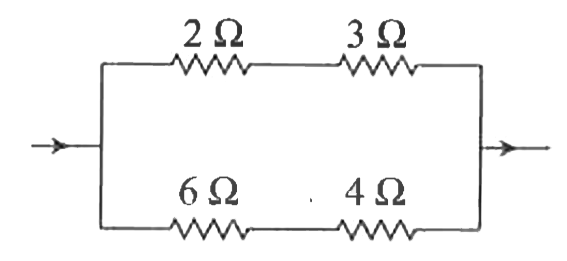Heat produced in a wire of resistance R due to current flowing at constant potential difference is proportional to
1R2
1R
R
R2
The correct Answer is:B
Step by step video, text & image solution for Heat produced in a wire of resistance R due to current flowing at constant potential difference is proportional to by Physics experts to help you in doubts & scoring excellent marks in Class 12 exams.
Topper's Solved these Questions
- BOOK - ERRORLESS CHAPTER - HEATING AND CHEMICAL EFFECT OF CURRENTEXERCISE - Heating Effect of Current2videos
HEATING AND CHEMICAL EFFECT OF CURRENT
- BOOK - ERRORLESS CHAPTER - HEATING AND CHEMICAL EFFECT OF CURRENTEXERCISE - Chemical Effect Current1videos
HEATING AND CHEMICAL EFFECT OF CURRENT
- BOOK - ERRORLESS CHAPTER - ELECTROSTATICS EXERCISE - Ordinary Thinking Objective Questions (Electric Flux and Gauss.s Law)28videos
ELECTROSTATICS
- BOOK - ERRORLESS CHAPTER - KINETIC THEORY OF GASESEXERCISE - QUESTIONS126videos
KINETIC THEORY OF GASES
Similar Questions
When a current flows in a wire of resistance R at a constan t potential difference, then the value of heat produced by a current is inversely proportional to:
View SolutionA cell is connected to a 9 ohm resistance, because of which heat of 400 J is produced per second due to current flowing through it. Obtain the potential difference applied across the resistance.
View Solution
Knowledge Check
- Question 1 - Select One
The heat produced in a wire of resistance 'x' when a current 'y' flows through it in time 'z' is given by:
Ax2×y×zBx×z×y2Cy×z2×xDy×z×x - Question 2 - Select One
The heat developed in an electric wire of resistance R by a current I for a time t is
AI2Rt4.2calBI2RCI2R4.2tcalDRt4.2I2cal - Question 3 - Select One
Statement I: A wire of uniform cross-section and uniform resistivity is connected across an ideal cell. Now the length of the wire is doubled keeping volume of the wire constant. The drift velocity of electrons after stretching the wire becomes one-fouth of what it was before stretching the wire.
Statement II: If a wire (of uniform resistivity and uniform cross section) of length l0 is stretched to length nl0, then its resistance becomes n2 times of what it was before stretching the wire (the volume of wire is kept constant in stretching process). Further at constant potential difference, current is inversely proportional to resistance. Finally, drift velocity of free electron is directly proportional to current and inversely proportional to cross-sectional area of current carrying wire.AStatement I is true, Statement II is True, Statement II is a correct explanation for Statement I.BStatement I is True, Statement II is True, Statement II is not a correct explanation for Statement I.CStatement I is True, Statement II is False.DStatement I is False, Statement II is True.
A cell is connected to a 9 ohm resistance, because of which heat of 400 J is produced per second due to current flowing through it. Obtain the potential difference applied across the resistance.
View SolutionAssertion : A wire of uniform cross-section and uniform resistivity is connected across an ideal cell. Now the length or wire is doubled keeping volume of wire constant. The drift velocity of electrons after stretching the wire becomes one fourth of what it was before streching the wire.
Reason: If a wire (or uniform resistivity and uniform cross-section) of length l0 is stretched by a factor n, then its resistance becomes n2 times the one before stretching the wire (the volume of wire is kept constant in stretching process.) Fruther at constant potential difference, current is inversely proportional to resistance. Drift velocity of free electron is directly proportional to current and inversely proportional to cross-sectional area of current carrying wire.View SolutionThe field due to a long straight wire carrying a current I is proportional to
View SolutionIn the circuit as shown in the figure, the heat produced by 6 ohm resistance due to current flowing in it is 60 calorie per second. The heat generated across 3 ohm resistance per second will be
 View Solution
View SolutionThe field due to a long straight wire carrying a current I is proportional to
View Solution

